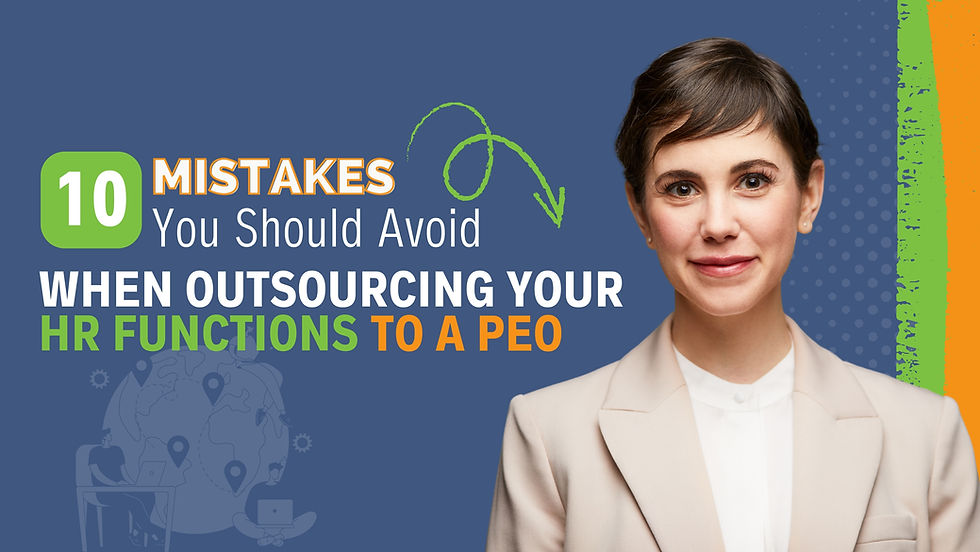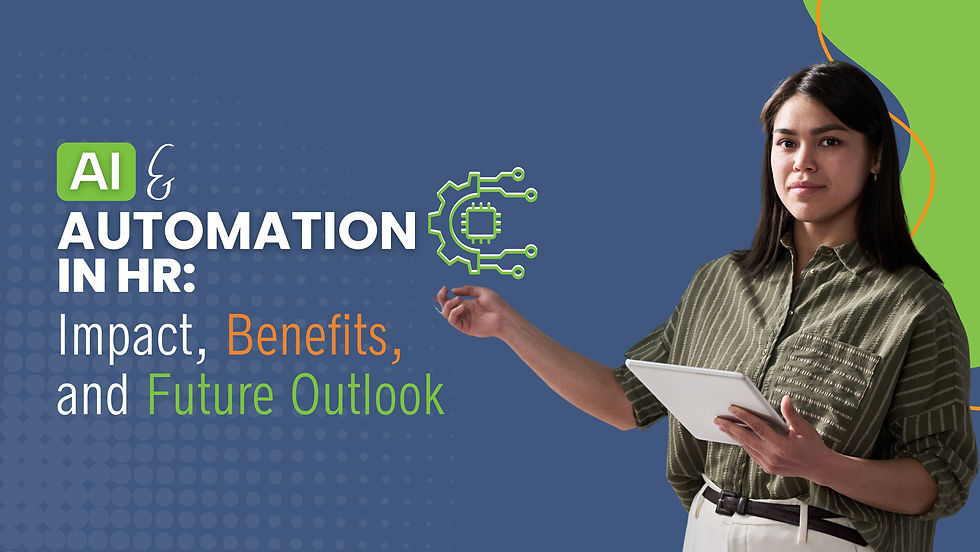What Benefits Can Small and Medium-Sized Businesses Expect When Partnering With a Certified PEO?
- Elijah

- Nov 21, 2025
- 6 min read

Small and medium-sized businesses still face many of the same challenges they did years ago, but today those challenges have grown more complex. HR remains one of the biggest pressure points. From compliance and payroll to hiring, onboarding, and managing employee experience, many SMEs simply don’t have the time, budget, or in-house expertise to keep up.
While large organizations rely on dedicated HR departments and established systems, smaller businesses often operate without a fully built HR function. This often results in bottlenecks, compliance risks, and avoidable inefficiencies that hold growth back.
This is where a Professional Employer Organization (PEO) makes all the difference. By partnering with a certified PEO (CPEO), SMEs can outsource the most time-consuming HR tasks, including expensive HR functions like payroll mangement and heathcare, stay compliant, and free up their internal team to focus on strategic growth rather than administrative burden.
So, what exactly is a PEO or a CPEO, and why are more businesses turning to them today?
What is a PEO?
For companies that aren't ready to hire a dedicated in-house HR team or a qualified HR professional, managing growth can be a complicated or overwhelming process. In such a situation, partnering with a PEO can be of immense help to the company. Essentially, a Professional Employer Organization takes away the burden and worry typically associated with staffing, payroll, workers` benefits, and compensations. And with those out of the way, your business can focus on the one thing that matters the most — your clients!
A PEO is an outsourced HR solution, which typically covers payroll, staffing, staff compliance to company policies, insurance, and other benefits. And guess what? Working with a PEO is often considered more economical and beneficial, especially for small businesses. At least, until your business grows enough muscles to hire a professional HR person, partnering with a PEO remains an excellent idea. PEO services generally cover the following:
All human resource consulting
Payroll processing
Safety and risk mitigation services
Workers' compensation
Health benefits
Access to 401K plan
Employer payroll tax filing
Implementing or enforcing company policies related to employment
But one important fact worthy of note here is that not all PEOs will give you the best HR solutions. The question now is, how then do you know which PEO offers services that align best with your HR needs? Or how can you tell a PEO vendor or option that's right for you from the one which isn`t? Well, the answer is quite simple; you should be on the lookout for a certified PEO or CPEO.
What is a CPEO and How is it Different from a PEO?
A Certified Professional Employer Organization (CPEO) is a PEO that has voluntarily completed the IRS certification process established under the Small Business Efficiency Act (SBEA). This federal program—introduced in 2014 and fully implemented in 2017—allows the IRS to formally recognize PEOs that meet strict financial, reporting, and compliance standards.
While any PEO can offer HR, payroll, and compliance services, only CPEOs have IRS certification, which comes with important legal and financial protections for employers. Today, the number of certified PEOs remains relatively small compared to the overall PEO market, making CPEO status a meaningful differentiator.
So why does certification matter?
1. Payroll Tax Liability Protection
With a non-certified PEO, your company and the PEO are jointly liable for federal payroll taxes. If the PEO fails to remit taxes, the IRS can pursue your business for the unpaid amount, even if you already paid the PEO.
A CPEO eliminates this risk. Once certified, the CPEO - not the client - is solely responsible for collecting and remitting federal employment taxes. This provides stronger financial protection and peace of mind.
2. Stronger Compliance Oversight
To maintain certification, CPEOs must undergo:
Annual independent audits
Quarterly financial reporting
Continuous IRS monitoring
These requirements ensure a higher level of operational discipline and transparency than non-certified PEOs are required to demonstrate.
3. Reduced Administrative Burden
Working with a CPEO means your HR and payroll operations run on a more reliable, compliance-driven infrastructure. For many small and medium-sized businesses, this translates to:
Fewer administrative errors
Lower risk exposure
A more stable HR and payroll environment
In essence, partnering with a CPEO provides all the benefits of a traditional PEO, plus federal recognition and added protection against costly compliance pitfalls.
If your goal is to scale with minimal disruptions, improve compliance certainty, and reduce financial risk, choosing a CPEO over a non-certified PEO is often the smarter long-term move.
Choosing a PEO that Suits Your Exact Company Needs
Choosing the right PEO is not just about outsourcing HR tasks; it’s more about finding a long-term partner who understands your business, reduces risk, and supports your growth. Here’s a clear step-by-step process to guide your decision:
1. Identify Your HR Pain Points and Goals
Start by assessing what you want to fix or improve. Ask yourself:
Do you need help with payroll and tax compliance?
Are you struggling with recruitment, onboarding, or employee retention?
Do you want better benefits to stay competitive?
Do you need support with multi-state compliance or rapid growth?
A clear needs assessment ensures you don’t overpay for services you won’t use—or underbuy what you truly need.
2. Confirm the PEO’s Accreditation and Certification
Not all PEOs are created equal. Check for:
IRS CPEO certification (for payroll tax liability protection)
ESAC accreditation (for financial assurance and compliance oversight)
NAPEO membership (industry best practices)
3. Evaluate the Range of Services Offered
PEOs vary in scope. Compare their offerings to your priorities:
Payroll and tax administration
HR support and employee relations
Recruitment and onboarding
Benefits administration (health, retirement, perks)
Risk management and workers’ compensation
HR technology platform and self-service tools
Choose a PEO with flexible plans, not a one-size-fits-all model.
4. Review Technology, Integrations, and Usability
Modern HR runs on software. So, ask about:
Ease of use for employees and managers
Reporting capabilities
Mobile access
Integrations with your existing tools (ATS, payroll, accounting, etc.)
Data security and compliance
5. Understand the Pricing Model
PEOs typically charge:
A percentage of payroll, or
A flat per-employee, per-month fee
Request a line-item breakdown to avoid hidden costs. Clarify:
Setup fees
Termination fees
Benefits markup
Workers’ comp premiums
Minimum headcount requirements
This is becaue transparency in pricing is non-negotiable, and is a sign of a trustworthy partner.
6. Ask About the Service Model
Some PEOs provide a dedicated HR specialist. Others use a ticketing or pooled support system. Ask the following imprtant onboarding questions:
Will we have a dedicated account manager?
What are response times?
Is support available during business hours?
Are onsite services available if needed?
Keep in mind that the right service model depends on your company’s complexity and pace of operations.
7. Request Client References and Industry Experience
You might want to get feedback from companies similar to yours:
Industry (manufacturing, healthcare, tech, retail, etc.)
Size
Geographic footprint
Growth stage
A PEO with experience in your sector is most likely better positioned to handle your challenges more effectively.
8. Review the Contract Carefully
Before signing your HR contract, pay attention to:
Term length and renewal clauses
Termination policies
SLA guarantees
Liability sections (especially around taxes and compliance)
Scope of services
When in doubt, have a legal professional review the agreement.
9. Ensure Cultural and Operational Fit
A PEO relationship is long-term. Make sure their approach aligns with yours:
Do they communicate clearly?
Do they understand your company values?
Is their team proactive or reactive?
Are they committed to helping you scale?
10. Start with a Pilot or Phased Rollout (if possible)
Some PEOs allow phased onboarding. This lets you:
Test their technology
Evaluate support quality
Work out any workflow issues
A small pilot can validate your choice before full adoption of the product.
Getting Started with the Right PEO Partner
Your small business needs the best support it can get, which is why it makes perfect sense to seek out the best PEO company and partner with them. But that also can sometimes be a real headache for small or medium-sized businesses. It's either you do not have the time to compare between many PEOs or you just do not know what to look out for.
At The Mission, we can take that concern off you by helping you secure a beneficial partnership with a certified PEO. We are a leading partner in the PEO, HR, payroll, and benefits outsourcing marketplace. We provide result-oriented services for small and medium-sized organizations and government contractors, serving as a trusted partner in integrated human resource compliance, risk management, employee benefits, employment practices liability insurance (EPLI), and payroll processing.



